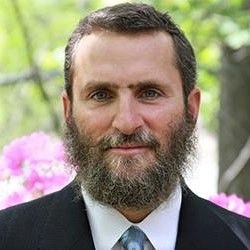Shmuley Boteach | JNS

Amir Ohana’s historic appointment as the first openly gay man to serve as Speaker of the Knesset is a symbol of Israel’s flourishing democracy and commitment to human rights. Even the Israel-haters who came out in force to condemn Israeli Prime Minister Benjamin Netanyahu’s new government as “the most extreme in Israel’s history” were forced into silence when an openly LGBTQ man became one of the most powerful people in the Jewish state. Recently, an anchor for Sky News Australia expressed her excitement to me, on-air, that in a Middle Eastern country, a gay man was about to reach the highest levels of power.
Ohana’s appointment is also a major fail for the myriad of journalists and pundits who have been decrying Israel’s new government for its supposed homophobia. Even the three leaders of the Religious Zionism Party, who many in the news media sought to portray as gay-haters, warmly supported Ohana’s appointment.
Itamar Ben-Gvir, Israel’s new national security minister and head of the Otzma Yehudit faction, tweeted a photo of Ohana embracing him. Ben-Gvir described Ohana as “a great man, with a big heart and the right man for this important position.” Bezalel Smotrich, Israel’s new finance minister and head of Religious Zionism, expressed no opposition. Even Avi Maoz, recently crucified by the media for opposing the Jerusalem Pride Parade, insisted that he had no issue with gay people, citing his plans to vote for Ohana as proof.
But on the horseshoe ends of the political spectrum — the far-left and the ultra-Orthodox — Ohana’s historic appointment was met with strangely similar disdain.
Knesset member Lahav Herzano of the Yesh Atid Party, who identifies as gay, denigrated Amir’s appointment as a “fig leaf” meant to conceal the new government’s homophobia. A similar term was used during an interview with Ohana by a reporter for Israel’s Channel 12 news. A columnist for Haaretz questioned the circumstances surrounding Ohana’s appointment, asking “what shame they are meant to cover.”
On the ultra-Orthodox side, Interior and Health Minister Aryeh Deri of the Shas Party accused Netanyahu of “tricking” him with the surprise appointment. “I headed out immediately after the speech,” Deri was said to have told other MKs. “I can’t understand the Haredi MKs who went to hug him after that address.”
But Deri himself hugged Ohana earlier in the ceremony. Deri is fortunate that Amir, who is a close and loving friend to me and my family, is too much of a gentleman to remind Deri of his criminal convictions and prison sentence, even as Deri embarrassed Amir at his moment of triumph.
Others went further, with United Torah Judaism MKs Meir Porush and Moshe Gafni covering their faces or turning away from Ohana when he discussed LGBTQ+ issues during his inaugural speech as Knesset speaker. One former Shas Knesseet member even suggested in a radio interview that instead of resigning, Ohana should “marry a woman.”
Most shocking, however, were the rabbis who chose to join in. Rabbi Shlomo Amar, the Sephardi Chief Rabbi of Jerusalem and a former Chief Rabbi of Israel, excoriated those members of the Knesset who, “thought to be [God] fearing,” still voted for Ohana’s appointment, calling their actions “a shame like no other.” Others went further, with the influential Rabbi Meir Mazoz describing Ohana as “stricken with a disease.”
Needless to say, these two influential rabbis disgraced both themselves and the Judaism they purport to represent by shaming a man whose willingness to risk his life to defend Israel helped give these rabbis the freedom to practice their faith in the first place.
It’s worth noting that, for Ohana, none of this is particularly new. When he became the first openly gay member of Knesset to be elected in an open primary in 2015, several MKs skipped his swearing-in ceremony. “With regard to the issue of LGBT rights,” Ohana joked at the time, “it would be wonderful if their absence would continue.”
Hearing this story, I was immediately impressed by Ohana, who spent 12 years in the Israel Defense Forces and Shin Bet working to protect Israeli lives. I blasted these MKs for offending a man who has given his life to the Jewish state and chosen to run with Likud, a party known for its warmth to religious communities and its trademark Jewish pride. Just one year after his election to the Knesset, Amir was honored in 2016 by my organization, the World Values Network, at our annual Champions of Jewish Values International Awards Gala.
Then in 2019, Netanyahu tapped Ohana to lead the Ministry of Justice, marking another step in Amir’s smashing of the political ceilings for Israel’s LGBT community.
That Israel’s first openly gay minister arose from Likud, I argued shortly after this appointment, proved first and foremost that Ohana himself was a politician driven not by a need for popularity but by convictions and belief. By joining Likud, Amir had rooted his political positions in what he believed to be true and just, even if wasn’t necessarily trendy.
Judaism also does not condemn anyone for being gay. While there is a commandment to refrain from gay sex, as well as a commandment that men should marry and have children, there are 613 commandments in the Torah. When Jewish gay couples tell me they have never been attracted to members of the opposite sex and are desperately alone, I tell them, “You have 611 commandments remaining. That should keep you busy. Now, go create a kosher home. Turn off the TV on the Sabbath and share your meals with many guests, as did Abraham. Pray to God three times a day for you are his beloved children. He desires you and seeks you out. And God loves you.”
I should add that Amir has two beautiful children with his spouse Alon whom my family remembers from when they were just babies.
Thankfully, other religious and political leaders rose to defend Ohana and reflect the Torah’s true intrinsic tolerance and compassion.
Chief Rabbi of the United Kingdom Ephraim Mirvis, who is soon to be knighted by King Charles III, went on Israeli television to criticize Ohana’s detractors, telling them every human being is created in God’s image and that love of a fellow Jew was a cardinal principle of the Torah.
“I don’t think this is a liberal position,” he told veteran Israeli news anchor Amnon Levy. “This is the Torah’s position.”
“‘Beloved is man for he was created in the image [of God].’ Every person is created in God’s image,” tweeted Netanyahu, condemning all statements against the LGBT community and Ohana. “That is the fundamental belief that was given to humanity thousands of years ago by our people, and it is the fundamental belief that guides us today.”
Always the quintessential mensch, Ohana has reportedly decided to hold his tongue on the entire matter and maintain his policy of “not attacking rabbis.” With his signature class and sensitivity, he tweeted: “It is better that I fail a hundred times in senseless love for Jews than once in senseless hate of Jews.”
He’s not worried. His primary and general election victories, and now his appointment to serve as Speaker of the Knesset, have already proven to Ohana what he always knew to be true: No amount of critics can stop a man driven by a love of Israel with a rock-solid commitment to dedicate his life to their welfare and protection.
Rabbi Shmuley Boteach is author of “The Israel Warrior and Holocaust Holiday: One Family’s Descent into Genocide Memory Hell.”







